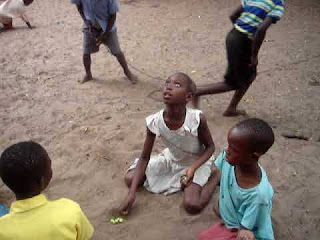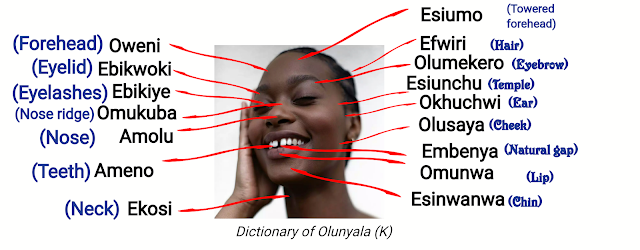ABANYALA BA KAKAMEGA: Reduplication in Nouns
The Olunyala (K) is a sub-dialect of Luhya language spoken by the Abanyala of Kakamega. The Language is internationally coded as ISO 939-3 nle.
CONCEPT OF REDUPLICATION
Reduplication is a word forming process in Olunyala (K). “Given a word with a phonological form X, then reduplication refers to XX or xX (where x is part of X and x can appear either just before X, just after X, or inside X). Conditions: (i) XX or xX must be semantically related to X. (ii) XX or xX must be productive.” (Kiyomi 1995:2).
The following reduplication in verbs illustrates this phonetic phonomenon.
- Okhuliolioma- <okhu> + <lio> + <lio> + <ma> The reduplication of the sound /lio/ occures before the word <lioma>
- Namukhokhome- <na> + <mu> + <kho> + <kho> +<me> The reduplication of the sound /xo/ occurs inside the word <namu......me>.
- Okhubeyabeya- <okhu> +beya> + <beya>. The reduplication of the sound /βeja/ occurs after the first <okhubeya>
-
Continuous aspect – action sustained over time. For example, khupakhupa “keep beating”
Intensification – increased force or completeness. For example, amekiremekire “scooped properly
Distributive meaning – spread over multiple entities. For example wuli mwanamwana “each child”
Augmentation – a large or small quantity. For example, okhasalasala “smal tree”
Expressive ideophones – vivid sensory descriptions. For example, kochokocho “intensely inside.
REDUPLICATION IN OLUNYALA (K) NOUNS
Exact reduplication: some nouns in Olunyala (K) have phonological forms showing exact reduplication as a process of word formation. Thus, the reduplicant is exact to the base.
- Etolotolo
- Esicholocholo
Partial reduplication: On the other hand, we have some words which have the second part of the word undergoing some slight phonological modification from that of the base.
- Ewoyawoye
- Omukoyakoye
- Omwayuayue
Olunyala (K) reduplication: basing on the conditions in the above definition, it can be said that Olunyala (K) nouns exhibit various types of reduplication: full reduplication, pseudo reduplication and fossilized reduplication.
- Esikhokhochole for a name of a place.
- Ekhirikhikhi for owl.
- Omusolili for a boy.
- Omusululu for soot.
- Akhafululu for a type of vegetable.
- Owulala for unity.
- Ekokopiro for gullet
- Esikhokho for an irregular wooden item having roots.
- Ekhokhonikho for empty shell.
- Owulili for bedding
- Akhakhasikhasi [<akha> + <khasi> + <khasi>] to mean a small wife of less value, a mere wife, something-like-a-wife.
- Ebikhasikhasi [<ebi> + <khasi> + <khasi>] to mean many small wives of less value. Also for a children's game where they play gender roles in society.
- Ochukhasikhasi [<ochu> + <khasi> + <khasi>] to mean devalued small wives.
- Okukhasikhasi- [<oku> + <khasi> + <khasi>] to mean devalued big sized wife, something-like-big-useless wife
- Esisachasacha <esi> + <sacha> + <sacha> to mean a devalued small man, something-like a useless man
- Omuleyileyi- having the quality of being tall ~leyi
- Akhalayilayi- having quality of being good.
- Omukutukutu- having quality of being short.
- Omulafulafu
- Omumalimali
- Omusirusiru
- Omuyingwayingwa
The following is a list of nouns that demonstrate fosilized reduplication of two syllables in their phonological form.
- Akhafutifuti [axafutifuti]- type of small caterpillar that raises up its middle body during locomotion.The name is borrowed from the english word 'foot' since the cartrpillar's movement imitates act of measuring.

Akhafutifuti - Epiriupiriu- cistocola bird
- Akhatietie- type of small bird, Cristocolas cristicola. The name is a reduplication of the sound made by the bird.
- Amafuefue (amafwefwe)- love-handles. it comes from the verb okhufwenyafwenyukha.
- Amakhandiakhandia- hard muscles meat.
- Amakhaukhau- type of fruits similar to pears.
- Amakherierie- cracks on feet, itchthyosis.
- Amakholiolio- septum.
- Amakokhakokha- dirt swept out of house.
- Amalolelole- conjunctivitis
- Amaluelue- shunny oil droplet in surface of soup.
- Amapalapala- spots
- Amaweriweri- state of deem visibility.
- Anang'ining'ini- shiny haphazardly moving particles. it comes from the verb okhung'ina which means to glitter.
- Ebiberebere- type of plant, lantana trifolia.
- Ebikotikoti- chicken pox
- Ebimulimuli- white flowers
- Ebinyamunyamu- type if weed of oxallis sp.
- Ebongobongo- Olive pigeon
- Efuafua- wondering jew, commelina sp
- Ekhaukhau- type of indigenous vegetables, wild pears.
- Ekhuyikhuyi- black stork bird
- Ekomakoma- two wheel toy.
- Ekulukulu- turkey. It is named based on its repeated sound of kulukulu
- Elingolingo- collar-borne.
- Emeramera- molten animal
- Engiriangiria- type of bird.
- Engurianguria- remote rural villages.
- Enjulanjula- type of plant, Solunum incanum
- Epilipili- pepper
- Epurupuru- moth
- Esicharachara- wind vane
- Esicholocholo- penis of a toddler.
- Esikhasikhasi- jealous akin to that between co-wives.
- Esikholokholo- heartbeat of anxiety.
- Esikolokolo- banana stampm
- Esikondikondi- forget-me-not.
- Esikhutukhutu- type of beetle.
- Esimiramira- the ability and taste that makes something worth swallowing.
- Esingayangaya,- purslane
- Esing'alung'alu- food cooked in a delicious manner. It comes from the verb okhung'ala since such a meal is a product of one who 'purposed to cook.'
- Esinyolonyolo- type of vegetable.
- Esiosio- communal fire at funeral
- Esipakapaka- wheelbarrow.
- Esipikipiki- motorcycle.
- Esipusiupisiu- ring finger.
- Esisotisoti- dragonfly.
- Esitalatala- raised platform for drying utensils
- Esitamutamu- sweets
- Esomisomi- muscle pull in rib area
- Etolotolo- yama.
- Namwituitui- blue headed crucol
- Olubalabala- brine taste.
- Olubichibichi- boyish behaviour during adolescence stage.
- Olufwotifwoti- english with norsal twang
- Olukalakala- allulation
- Olukhasikhasi- childish play imatiting family gender roles. Comes from noun omukhasi since the play has a character who is a wife.
- Olumoolimooli- pride slow movements. It comes from the verb okhumoola.
- Oluparipari- row between two parallel lines. It comes from the word okhuparia.
- Oluuwukawuka- nightjar bird. It comes from the verb okhuwuka due to the sound made by the bird.
- Omubinubinu- type of tree, Cassia didymobotrya fam. Caesalpiniaceae. It comes from the verb okhubina since the tree is believed to be a good ingredient for stopping disturbances from a night runner.
- Omuchabachaba- type of tree
- Omuchoochoo- type of tree
- Omukabakaba- type of tree, Ficus verr
- Omukesikesi- cunning person.
- Omukhalakhale- one from the the old generation.
- Omukorokoro- two kilograms tin container.
- Omukoyakoye- type of tree, Paulinia pinnata L.
- Omulamalama- type of tree, Piliostigma thoningii.
- Omutungutungu- nandi flame tree.
- Omupayipayi- pawpaw tree.
- Omusubasuba- Sesbania Sesban.
- Omuyamayama- type of tree.
- Omwikholiokholio- a lot of pretence.
- Opichapicha- swallow bird.
- .
Those with slight modification on base.
- Esikolakole- water beetle
- Ekhirikhikhi- owl
- Ewoyawoye- soft shelled egg.
- Omukhalakhale- castro oil plant.
- Omukoyakoye- climber type.



Comments
Post a Comment